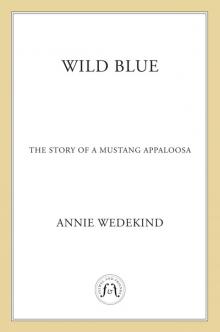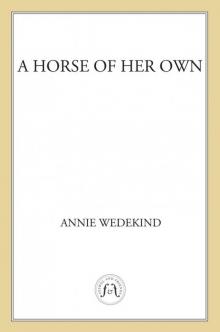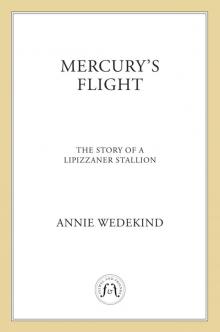- Home
- Annie Wedekind
A Horse of Her Own Page 2
A Horse of Her Own Read online
Page 2
“When I was your age, the only boys I thought were handsome were of the human variety,” Grace Ryan said, then smiled at the skeptical look on Jane’s face.
“Mum, please, I don’t want to know.” Jane redoubled her efforts, shading in Beau’s mane and forelock.
Mrs. Ryan sighed and went back to drying the dishes. She understood her daughter’s love of drawing better than her love of horses. She was a painter herself and taught at the local university, where Jane’s father taught history.
Trying for a combination of dignity and mischief, Jane realized that her drawing made Beau look half-asleep, so she got up to help her mother, wondering for the thousandth time why her family was the only one she knew that didn’t have a dishwasher. Even their toaster and coffeepot were older than Jane, but at least the Ryans had those. Still, as she stacked the blue-and-white plates in the cupboard, she also knew how much she loved their old house, with its wide pine floorboards, high ceilings, and enormous windows with their wavy, imperfect glass. It was a big house in a run-down neighborhood in downtown Louisville, where many students and professors lived. Mr. Ryan claimed that he bought it for the willow tree in the front yard, and Mrs. Ryan said it was for the wavy glass.
Everything about 648 Chestnut Street felt like home, from the overburdened bookcases to the small screened porch in back, where they ate during the summer. The house was so drafty and difficult to heat that in the winter they had their meals on a low table in front of the fireplace in the living room, sitting on cushions on the floor. When Jane had dinner with Robin’s family for the first time and they’d gathered around the dining room table, she’d blurted out, “Why are we eating on chairs—it’s not Thanksgiving!” and Robin, who’d been over to the Ryan house many times, had nearly collapsed laughing, while her parents looked on in confusion.
No, Jane was glad she didn’t live in the Winding Falls subdivision with Robin’s grand, chilly family in their perfectly appointed, almost-new brick mansion. She was glad she had the sort of parents she did—funny, impractical, absentminded people who talked to her and her sister about ideas and books and art, as if they were grown-ups, too. She wouldn’t trade any of it, not really, not even if it somehow guaranteed her admittance to the clique. Of course, it was much easier to remember that here, in the snug yellow kitchen with her mother, than it was at Sunny Acres. Yes, she’d keep the lack of a dishwasher, the pipes freezing in the winter and making hills in the kitchen floor, even being downtown, and thus an hour away from the farm—if only they could figure out a way to afford for her to have a horse of her own. For her to have Beau.
And soon this house that she loved was going to change irrevocably, and Jane couldn’t bear to think about it. Lily would be going away to college in the fall. Everything was going to be different. No longer would she hear Lily singing in the bathroom every morning, her voice carried through the vent to Jane’s attic bedroom, waking her up. No longer would Lily fling herself dramatically on Jane’s bed, recounting tales of disastrous dates and nerve-shattering auditions, beastly high-school teachers, and her dreams of becoming a famous actress. No longer would Jane be able to knock on Lily’s door late at night, slipping into her sister’s messy, clothes-strewn room, and tell Lily all of her fears about not being popular, not being pretty enough, not fitting in. Part of Lily’s magic was that she always seemed to know what to say and could always make Jane laugh.
Tonight, Jane couldn’t think about it. Tonight, all she could think about was the next day’s lesson.
Tonight, all she wanted was to be named one of the best riders at Sunny Acres.
But could she do it without a horse of her own?
Jane tore up the drawing of sleepy Beau, walked down the narrow hall that connected the kitchen to her father’s study, and pushed open the screen door leading to the porch. She could smell her father’s pipe and saw his profile emerge from the large wicker armchair, where he sat and listened to the crickets and birds on summer evenings. Looking out over the leafy, still backyard in the dusk, you could forget you were downtown.
“Ready for a game of slipper in the fan?” he asked, and their small speckled mutt, Hopper, pricked his ears. It was his favorite sport: Mr. Ryan would turn on the porch’s ceiling fan, throw one of his ancient leather slippers up to its blades, and Hopper would madly scramble to catch the flying slipper wherever it was tossed. On the small porch, it couldn’t go far, and Mrs. Ryan had learned long ago not to keep any breakables or delicate plants in the vicinity.
“Sure,” Jane said, and reached up to pull the fan’s cord. But something in her voice made her father pause, slipper in hand, and turn to her.
“Maybe not just now,” he said to Hopper, and lay an apologetic hand on the dog’s head. Hopper put his chin back on his paws and seemed content to resume dozing. Jane slumped into a chair next to her father and stared out into the firefly-speckled square of dark beyond the screens.
“Are you glad school’s almost over?” Geoffrey Ryan asked.
“I guess,” Jane said. She was, in fact, looking forward to the last day of school and, more important, the last day of eighth grade. Next year she would enter high school, and she still hadn’t decided where she was going to go. For weeks, her parents had been reminding her that she had to make a decision. She could stay at St. Anne’s, where she’d been since fifth grade. Although the Ryans weren’t Catholic (in fact, they never went to church at all), they’d enrolled Jane because of the school’s academics, and because it was the only private school they could afford, convinced Jane wasn’t “challenged” enough at the public elementary school she’d started in. Jane was bored of St. Anne’s, though she liked the nuns and her classes for the most part, and liked teasing her parents about saying Masses for their souls. But she hadn’t grown very close to the girls there—who had known one another since kindergarten, and who sometimes admired her drawing in Art but otherwise left her alone—and the school was a long bus ride away. Plus she’d worried to Lily that if she never spent time with boys—after all, Sunny Acres was almost all girls as well—she’d soon be even more of a social disaster than she already was.
Then there were the two other schools where she had a place—one was Collegiate, the prestigious high school Robin, and Alyssa and her friends, would be attending next year, and where she’d been offered a partial scholarship through the Ryans’ affiliation with the university. The other she had discussed with her parents only in passing: Martin Luther King Jr. High, called simply “MLK” by the bands of students that Jane often saw rambling down Chestnut Street in the afternoon, was her local public school (at only five blocks from her house, very local). Camouflaged by the dull blue-and-green plaid of her own school uniform, Jane thought these clutches of teenagers looked like shaggy, rather exotic birds: students of all races in all possible manners of styles and clothes.
“I want to go someplace new,” she said, thinking aloud. She could always do this with her father.
“Well, I can understand that,” Mr. Ryan said. “But don’t you think being in high school will be new enough without changing schools?”
This was logical, but still Jane wanted to shout, No! I want to go somewhere that I can be a new person! Where I can start over and walk down halls where I’m not the Jane who never quite fits anywhere. She’d fantasized about Collegiate, the rolling, manicured green lawns of the campus, the mellow brick buildings trimmed with white, and the funny school traditions and catchphrases Alyssa and Jennifer always referenced. About actually having Robin with her every day … and that suddenly (somehow, miraculously) she would be accepted into the clique. The dances. The swimming parties. Knowing, for once, what everyone was talking about …
But what if it didn’t work? What if she remained the misfit, just like she was at Sunny Acres? And what if Robin tired of Jane and decided to accept Alyssa’s invitations, leaving her out? Why would she want to stay friends with the Gayle M. Rapley Children of Faculty Fellow who had to study all the time to keep
up her grades? Not to mention that even with the scholarship, Collegiate would still be more expensive than St. Anne’s, the possibility of a horse of her own even more remote … . Jane got tired just thinking about it—it was all too complicated, too impossible to sort out.
“Dad, I don’t want to talk about it right now, okay?”
“Okay,” Mr. Ryan replied softly, and Jane silently thanked him for saying nothing else. She knew her father was beginning to worry about her school choice, and she felt a warm surge toward him for understanding that she needed time to decide—and that she wasn’t going to decide tonight. She had something else to ask him, however hopeless it might be.
Jane took a deep breath. “There’s something else I wanted to talk about.”
“I had a feeling.” Jane could hear the smile in his voice.
“It’s just that camp is coming up soon. And it’s going to be different this year—it’s going to be much more competitive, and Susan’s dividing my group into two. And Dad, I’ve got to be in the top group, I just have to, and I don’t think I will be, and”—Jane felt unwanted tears welling into her eyes—“and I just wish that I could have my own horse, more than anything. I don’t care what school I go to next year, really, I just want to be able to ride my own horse this summer, more than anything I’ve ever wanted in my whole life, Dad!” She stopped, unable to continue.
Mr. Ryan sighed. “Honey, you know we’ve talked about this before—” he began.
“I know! And you always say the same thing!” Jane tried to keep her voice calm, like his, but all of her emotions came rushing up, and she felt powerless to stop the tears that began coursing down her cheeks.
“It’s because that thing is true—we simply can’t afford it,” Mr. Ryan said with finality. “I wish we could, but we can’t. It’s hard enough paying for school, and for your lessons and camp. And now with Lily going to college, even with her theater scholarship, it’s going to be even tougher. I know how much you want a horse, but—”
“You don’t know!” Jane cried. “Nobody understands at all!” Jane ran from the porch, knowing she was being unfair, but filled with such a painful ache and frustration that she had to be alone. They couldn’t understand that riding was to her what acting was to Lily—the thing that made Jane herself and no one else. The thing that was hers.
She shut herself in her room and pretended to be asleep when her mother, then Lily, came to say good night. Finally, her father opened her door, and she peeked out from her covers. His worried face framed in the doorway, he whispered, “Good night, Jane. I love you.” He turned off the hall light, and Jane surrendered to tears of remorse and longing.
Chapter 3
The Nutty Knight
Janoo, time to wake up!” Jane opened her eyes and found Lily sitting on the edge of her bed, softly shaking her.
“Hi,” she murmured. “What are you doing up so early?” Lily was a notoriously late sleeper on the weekends, declaring Saturday mornings “sacred.” Now she looked half-asleep still, her wavy dark brown hair sticking up at alarming angles, her eyes drowsy. Jane—and too many boys for their father’s peace of mind—thought Lily looked like a movie star: petite and curvy (unlike Jane, who was tall and stick-straight), with enormous deep blue eyes and a wide, full smile.
“I thought I’d make you breakfast. Today’s a pretty big day, isn’t it?” Lily said.
Jane grinned at her. Of course Lily hadn’t forgotten. Even with graduation in just a few days, she’d remembered that Jane had told her that today she’d be judged for which group she’d ride in at camp. Jane sat up and hugged her sister. “You’re my hero,” she said.
“This is indeed one of my nobler sacrifices. You’d better get ready. I’m making French toast and Oeufs à la Lily.” These were Jane’s favorite—eggs fried over so hard that their father always complained that they were like eating leather.
The phone rang as Jane was swirling her eggs in syrup, causing more groans of protest from Mr. Ryan. “Have you heard?” Robin asked breathlessly.
“What? No—heard what?” Jane felt a sudden burst of hope. Maybe Emily had decided to go to the beach this summer! Maybe Alyssa had come down with the flu! Robin’s next words brought her back to earth.
“Emily got a new horse. They brought him to Sunny Acres two days ago. I heard he’s this huge chestnut warm-blood, and he’s, like, almost seventeen hands … . Jane, are you there?”
Jane’s mind had actually wandered. “But what about Georgia Belle?” She was picturing Emily’s other horse, a lithe black Thoroughbred with a big white blaze running down her face.
“Her parents sold Belle to one of their friends. They have a daughter who wants to start riding, I guess. But Jane, this horse is practically a champion. He’s won big competitions already.”
“But how can she just sell Georgia Belle like that?” Jane asked incredulously. “Like she’s just a … a … chair or something?”
“I know,” Robin said. “But I don’t think Emily felt about her the way you feel about Beau or I feel about Bess. She was just a horse.”
Just a horse?
And then it hit her. “Rob, if Emily’s … if the new horse …”
Her voice trailed off. But she was sure Robin could guess what she was thinking. With a new horse, a champion, Emily might be impossible to beat for a place in Advanced I.
Unfortunately, Jane had a long car ride to think about it. Sunny Acres was in the true farmland of Kentucky, on the road to Lexington and an hour from downtown. It was half that distance for Robin and the other girls, who lived in communities like Winding Falls, which had such similar names (Willow Creek, Oak Bluffs) that Jane always got them confused. Because of the distance, and the Ryans’ budget, during the school year Jane only rode on Saturdays, but the girls who boarded their horses at the farm went several times a week. Luckily for her parents’ patience, and their aging car, Robin’s family drove Jane back to their house after lessons, and she got a ride the rest of the way with the Zimmermans’ silent, somewhat forbidding housekeeper, Mrs. Lakovic, who lived a few blocks over from Jane.
When Jane’s mother dropped her off, the sky was gray and low over the farm, threatening rain, and the warm early-summer air smelled of electricity. It made her heart race, the brewing feeling of the day, the way the green of the fields and trees stood out against the dark and light clouds scudding across the sky. An intermittent breeze tossed up sawdust around the entrance to the first barn. Jane felt as unsettled as the weather.
Jane squared her shoulders and tried to put the thought of Emily’s horse from her mind, but it stayed with her, knotting her stomach. What was going to happen today? Had she just lost what slim chance she had?
Emily was at the center of a group of riders standing around the door of the second stall, talking loudly. “Isn’t he awesome?” she exclaimed.
“Absolutely,” Alyssa said brightly and hugged her friend. “I’m so glad you finally have a horse that’s as good as Ariel.”
Jane saw Emily’s face twist with annoyance.
Jane stood at the edge of the group, her presence unacknowledged, and peered into the stall. She caught a glimpse of strong, tall, brilliantly chestnut hindquarters, saw a flash of white-stockinged legs restlessly pacing. Then the horse swung around suddenly, almost charging the door—
Enormous liquid eyes, flaring pink nostrils, a neck arched like a bow. A short red mane that bristled from the muscular curve of his neck like brushfire. Ears pricked forward, then pinning back as the magnificent horse lunged, snorting furiously at the girls hovering outside, his hooves banging against the door.
“What a sweetheart,” Jessica muttered.
“Oh, he’s just stirred up,” Emily said nonchalantly. “It’s being in a new place. He should settle down soon. You know, he’s pure Hanoverian, and they’re, like, the best ever.”
“I heard your first ride wasn’t that smooth,” Jessica said. Her voice was casual, but the sharp look she gave Emily made the che
stnut horse’s new owner flush.
“He’ll be fine today.”
“Mm. Well, we should get tacked up. You behave yourself, big boy.” Jessica reached in to stroke the white swirl of hair, like an elongated question mark, on the giant horse’s forehead, then quickly drew her hand back at his bared teeth. “Good lord!” She laughed, unperturbed.
Jane caught up with her at the tack room.
“So what happened when she rode him?”
“We-ell,” Jessica drawled, “he was a nightmare. Keep this to yourself”—Jane was sure she was the last person to hear the story, but she appreciated Jessica’s mercurial camaraderie—“but Liz came out to ride with her yesterday, and she said he was crazy. Tried to kick Lady Blue, totally spazzed out in the ring, almost threw Emily. Finally Susan had to get on him to settle him down.” Jessica rolled her eyes.
“But I thought he had won shows already,” Jane said.
“That’s the thing—he has. A bunch. His owner only sold him because she’s going to college in California. Or so she said. She hadn’t shown him since last fall, though, and the rumor is that she was having problems with him, too.”
“Then why did Emily’s parents buy him?” Jane wondered.
“Because their darling daughter wanted him. She only saw him for a second, over at Long Run, and fell for the flashy look and the blue ribbons hanging from his stall. She’s been whining at her parents nonstop, but her dad kept saying they couldn’t afford it. She must’ve worn him down. Lord knows what’s going to happen. He could be the best horse here—or he could break her neck.”
“I guess we’ll find out,” Jane said, gathering one of the beat-up saddles that belonged to the barn and taking Beau’s bridle down from its peg. A saddle of her own would be nice, she thought, as she always did, like the gleaming, padded leather Jessica held over one arm. Each week she used one of the pancake-flat, hard saddles that she shared with the beginners. Still, she was used to it. It was odd hearing of Emily being denied, at least for more than a second, something she had her heart set on. But she’d gotten the horse in the end, whatever the price.

 Wild Blue - The Story of a Mustang Appaloosa
Wild Blue - The Story of a Mustang Appaloosa Little Prince - The Story of a Shetland Pony
Little Prince - The Story of a Shetland Pony Samirah's Ride
Samirah's Ride A Horse of Her Own
A Horse of Her Own Mercury's Flight - The Story of a Lipizzaner Stallion
Mercury's Flight - The Story of a Lipizzaner Stallion